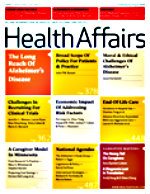 Dr. Julie Bynum moderates the Health Affairs briefing on the special issue on Alzheimer's disease.
Dr. Julie Bynum moderates the Health Affairs briefing on the special issue on Alzheimer's disease.We all have Alzheimer’s disease.
This is a key message I took away from the April special Alzheimer’s issue of Health Affairs, the country’s leading health policy journal. One of the contributing authors, Jason Karlawish, makes this point writing about the ethical challenges inherent in caring for patients losing their cognitive abilities and autonomy. Inevitably, the disease belongs to caregivers and other people in that patient’s life.
This difficult truth was recently brought home in a Health AGEnda post by Corinne Rieder, our executive director and treasurer, as she recounted her mother’s long struggle with Alzheimer’s disease.
As Karlawish and the other featured authors (including many grantees of the John A. Hartford Foundation) offer related policy recommendations in the pages of Health Affairs, it is also clear that the impact of Alzheimer’s disease—and the responsibility to address it—belong to all of us as a society.
Alzheimer’s is unique among the top chronic disease killers such as heart disease, cancer, and stroke because of its incurable, inexorable, and incapacitating nature. It holds a dreaded place for individuals and families facing the fatal disease. The same is becoming true for our country.
With its correlation to age and the booming older adult population leading to its dramatic increase (3 million U.S. cases in 2011, a projected 10 million in 2050) and with its enormous financial costs (estimated as high as$215 billion each year in this country), I believe Alzheimer’s has finally been recognized for the crisis it is.
The question is, how do we grapple with it?
 As the Health Affairs issue clearly shows, this gigantic, complex problem will require a multi-faceted approach. Surely, we need increased investments in research to find a cure, treatment, or way to delay the onset of this dementia, as outlined in the National Plan to Address Alzheimer’s Disease, made possible through the National Alzheimer’s Project Act signed into law in 2011. As Marie Bernard and other National Institute on Aging staff recommend, the plan’s ambitious goal to both prevent and effectively treat the disease by 2025 will require better connected health data registries, new partnerships between researchers and clinicians, and new ways of recruiting diverse volunteers into clinical research trials.
As the Health Affairs issue clearly shows, this gigantic, complex problem will require a multi-faceted approach. Surely, we need increased investments in research to find a cure, treatment, or way to delay the onset of this dementia, as outlined in the National Plan to Address Alzheimer’s Disease, made possible through the National Alzheimer’s Project Act signed into law in 2011. As Marie Bernard and other National Institute on Aging staff recommend, the plan’s ambitious goal to both prevent and effectively treat the disease by 2025 will require better connected health data registries, new partnerships between researchers and clinicians, and new ways of recruiting diverse volunteers into clinical research trials.
More in line with the Hartford Foundation’s current work, several Health Affairs articles focus on what we can do now, today, to change health care practice to improve the lives of dementia patients and their family caregivers. Julie Bynum, a long-time Hartford grantee who served as guest editor for this special issue, also moderated a panel discussion with several of the researchers who contributed articles. You can watch a video of the event on the Health Affairs site.
In the special issue, Dr. Bynum provides an overview of the different domains where we should focus policy changes: health care, long-term services and supports, public health, housing and community services, labor, and law enforcement.
She points to the importance of considering Alzheimer’s in current policies focused on the elderly dual Medicare-Medicaid population, of which 18 percent have been diagnosed with dementia, and on nursing homes, where 60 percent of residents have a dementia diagnosis. Dr. Bynum also notes the need for strategies to assist dementia patients and families wishing to avoid nursing home placement through Medicaid home and community-based programs.
 Panelists discuss the special Alzheimer's issue at the recent Health Affairs briefing.
Panelists discuss the special Alzheimer's issue at the recent Health Affairs briefing.However, institutional care will remain a reality for many dementia patients and Joe Gaugler and co-authors write specifically about Alzheimer’s in nursing homes. Their policy recommendations include ensuring nursing home access by properly weighting behavioral and psychological symptoms that might not fall under current functional impairment categories that determine residential eligibility.
They also recommend policies that support nursing home quality pay-for-performance initiatives and requirements to explicitly plan for dementia patients in new integrated health plans for dually enrolled Medicare-Medicaid beneficiaries.
Current en vogue policies focused on reducing hospital and emergency department use also need to incorporate considerations of the rapidly growing dementia population. As Joshua Wiener and co-authors report, Alzheimer’s and dementia patients in fee-for-service Medicare are significantly more likely to be hospitalized or visit the ER in any year than older adults without dementia.
The Health Affairs issue also highlights promising care models for dementia in primary care settings. David Reuben and colleagues report on their dementia care program at UCLA and Malaz Boustani and his team report on their work at Eskenazi Health Center in Indianapolis. Both models are currently being funded through the federal Center for Medicare and Medicaid Innovation.
Their models incorporate specially trained dementia care managers and redesigned practices to meet the needs of Alzheimer’s patients and their family caregivers. Dr. Boustani’s Healthy Aging Brain Center model, which also addresses depression, has importantly showed that improving the quality of care for patients with dementia can also reduce health care costs.
 Dr. Gary Epstein-Lubow
Dr. Gary Epstein-LubowThere is much more to learn in the Health Affairs issue and I encourage you to read this excellent issue in this excellent journal (which we also proudly support through grant funding). Workforce needs, end-of-life planning, elder abuse, and Alzheimer’s in the African-American population are all covered. One of our Centers of Excellence Scholars in Geriatric Medicine, Gary Epstein-Lubow, shares a personal account of dealing with Alzheimer’s in his own family (and he talks about it with PBS News Hour).
The John A. Hartford Foundation will be doing its part to address these issues, both through our Change AGEnts Dementia Caregiving Network (of which Dr. Gaugler is a member), and potentially as part of other work in our Models of Care and Policy/Communications portfolios.
Dr. Karlawish—who also has a number of good policy suggestions from “prescriptions” for caregiver training to extending hospice benefits for dementia patients—not only helped me realize that “we all have Alzheimer’s disease.”
His article concluded with the million dollar question that we as a country will need to continually ask: “How should we live with it?”
